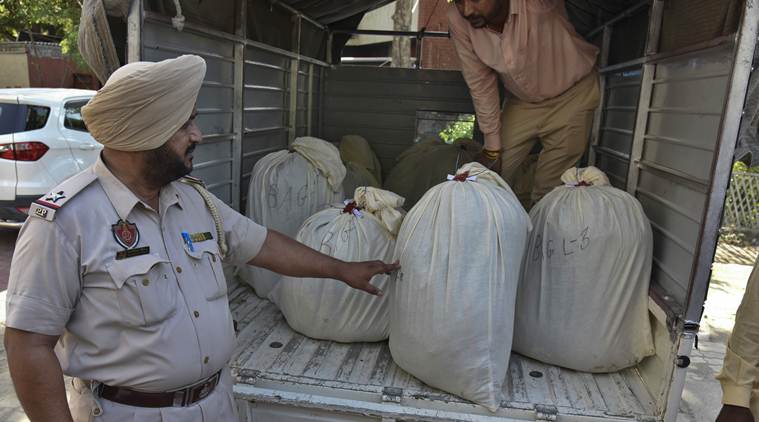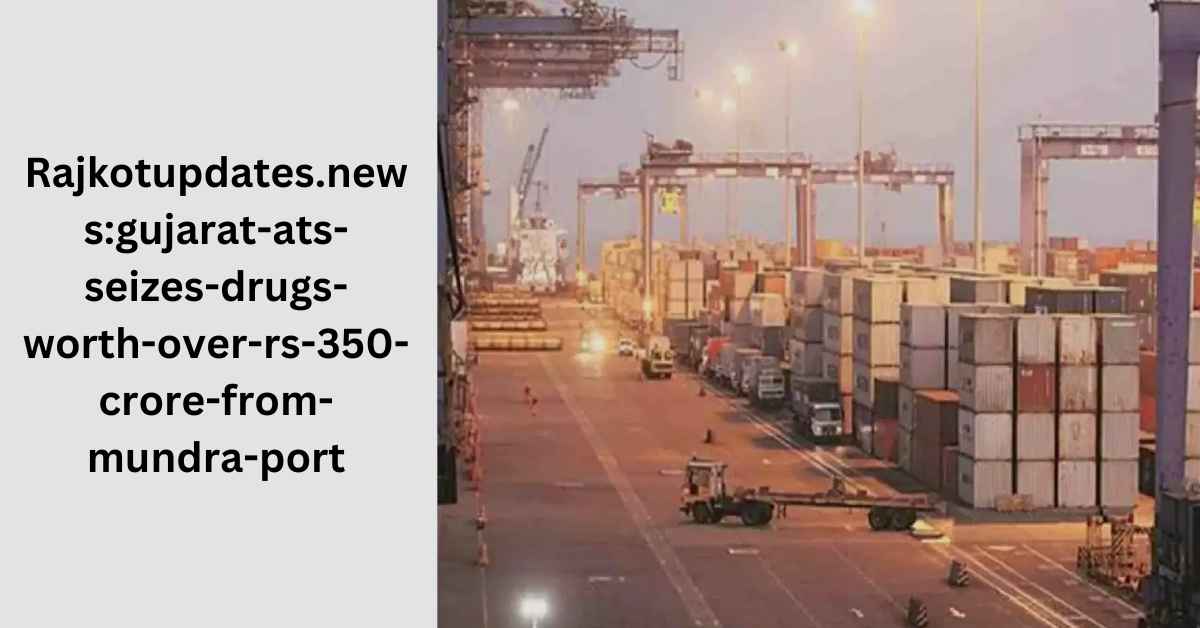Rajkotupdates.news:gujarat-ats-seizes-drugs-worth-over-rs-350-crore-from-mundra-port
The Gujarat Anti-Terrorist Squad (Rajkotupdates.news:gujarat-ats-seizes-drugs-worth-over-rs-350-crore-from-mundra-port) has seized drugs worth over Rs. 350 crore from the Mundra Port in Gujarat. The operation resulted in the arrest of several individuals involved in the smuggling of illegal substances.
The incident has once again highlighted the severity of the drug menace in the country and the need for stricter enforcement measures to tackle it.
In this article, we will delve deeper into the Gujarat ATS drug bust and provide insights into the types of drugs seized, the modus operandi of the smugglers, and the impact it can have on society.
We will also answer some frequently asked questions related to drug trafficking and conclude with a call to action for authorities to take more stringent measures to curb this menace.
Types of drugs seized Rajkotupdates.news:gujarat-ats-seizes-drugs-worth-over-rs-350-crore-from-mundra-port
The Gujarat ATS seized a total of 1,810 kg of drugs, including heroin, cocaine, and MDMA. Heroin is a highly addictive and illegal substance derived from the opium poppy plant.
Cocaine is a stimulant drug that is extracted from the leaves of the coca plant. MDMA, also known as ecstasy, is a synthetic drug that alters mood and perception.
The seizure of such a large quantity of drugs is a significant achievement for the authorities, as it would have caused immense harm to society had it reached the market.
These substances not only lead to addiction but also result in several health problems and can be fatal if consumed in large quantities.
Modus Operandi of the smugglers
The Rajkotupdates.news:gujarat-ats-seizes-drugs-worth-over-rs-350-crore-from-mundra-port has revealed that the smugglers used sophisticated methods to conceal the drugs.
They had hidden the drugs in containers carrying industrial goods such as tiles, sanitary ware, and ceramic products.

The containers were then transported via sea routes from Afghanistan, Iran, and Pakistan to the Mundra Port.
The authorities were able to bust the racket with the help of intelligence inputs and by tracking the movement of the containers.
The investigation is still ongoing, and the Rajkotupdates.news:gujarat-ats-seizes-drugs-worth-over-rs-350-crore-from-mundra-port is trying to identify and arrest all the individuals involved in the smuggling operation.
Impact of drug trafficking
Drug trafficking is a severe menace that not only affects the health and well-being of individuals but also has several social and economic implications.
The drug trade fuels organized crime, corruption, and violence, and the profits generated from it are often used to fund other criminal activities.
The seizure of drugs worth over Rs. 350 crores in Gujarat is a significant blow to the drug mafia, and it will disrupt their supply chain and operations.
However, it is essential to note that drug trafficking is a global problem and requires concerted efforts from all stakeholders, including law enforcement agencies, policymakers, and society at large, to tackle it effectively.
How did the Rajkotupdates.news:gujarat-ats-seizes-drugs-worth-over-rs-350-crore-from-mundra-port discover the drugs at Mundra Port and what was the operation like?
The exact details of how the Gujarat ATS discovered the drugs at Mundra Port have not been disclosed to the public.
However, according to reports, the Rajkotupdates.news:gujarat-ats-seizes-drugs-worth-over-rs-350-crore-from-mundra-port received intelligence inputs about the smuggling of drugs at the port, which led to a detailed investigation.
Also Read: rajkotupdates-newsreliance-is-working-with-google-to-launch-5g-phone
The operation to seize the drugs was reportedly carried out over several days and involved a coordinated effort between various law enforcement agencies.
The operation involved surveillance and monitoring of the port area, identification of suspicious containers, and physical inspection of the containers.
The ATS officials were assisted by the customs officials and the port authorities in carrying out the operation.
The drugs were found concealed in a shipment of gypsum stones, and it is believed that the smugglers had used sophisticated methods to hide the drugs.
What is the impact of drug trafficking on the society and the economy of India?
Drug trafficking has a significant impact on the society and economy of India. Here are some of the effects:
- Public health: Drug trafficking leads to a rise in drug addiction and substance abuse, which has a negative impact on public health. Drug addiction can cause physical and mental health problems, including heart disease, liver disease, respiratory problems, depression, and anxiety.
- Crime: Drug trafficking is often associated with other criminal activities, such as money laundering, human trafficking, and terrorism. This leads to an increase in crime rates and a decrease in public safety.
- Economic impact: Drug trafficking leads to a drain on the economy due to the cost of law enforcement, healthcare, and other related expenses. It also leads to a loss of productivity and revenue due to the impact of drug addiction on the workforce.
- Social impact: Drug addiction and substance abuse can have a negative impact on families, leading to breakdowns in relationships, financial problems, and other issues. It can also lead to an increase in social problems, such as homelessness and poverty.
- Stigma: Drug addiction is often stigmatized in society, which can lead to discrimination and a lack of support for those struggling with addiction.
What kind of drugs were seized by the Gujarat ATS at the Mundra Port and how much were they worth?
According to reports, the Rajkotupdates.news:gujarat-ats-seizes-drugs-worth-over-rs-350-crore-from-mundra-port a large quantity of heroin, which is a highly addictive and illegal drug. The exact amount of heroin seized has not been disclosed, but it is reported to be worth over Rs. 350 crore, which is approximately USD 47 million.
The drugs were found concealed in a shipment of gypsum stones that was being transported through Mundra Port, which is one of the largest ports in India.
Also Read: thesparkshop.in:product/flower-style-casual-men-shirt-long-sleeve-and-slim-fit-mens-clothes
The seizure of such a large quantity of drugs is a major blow to the drug trafficking networks operating in the region, and it is expected to have a significant impact on the supply and distribution of heroin in the country.
How can drug trafficking be prevented?
Drug trafficking can be prevented by taking several measures such as:
- Strengthening law enforcement agencies and implementing stricter border controls to prevent the entry of illegal substances into the country.
- Increasing public awareness about the dangers of drug abuse and promoting drug-free lifestyles.
- Providing rehabilitation and treatment facilities for drug addicts to help them overcome addiction.
- Developing alternative livelihoods for communities involved in drug production to discourage them from growing illicit crops.
- Promoting international cooperation and coordination to tackle the problem of drug trafficking globally.
How can society contribute to preventing drug trafficking?
Society can contribute to preventing drug trafficking by:
- Reporting any suspicious activities related to drug trafficking to the authorities.
- Refraining from using and promoting drugs and encouraging others to do the same.
- Supporting organizations that work towards drug abuse prevention and rehabilitation.
- Raising awareness about the dangers of drug abuse and educating children about the risks associated with drug use.
Conclusion on Rajkotupdates.news:gujarat-ats-seizes-drugs-worth-over-rs-350-crore-from-mundra-port
The Rajkotupdates.news:gujarat-ats-seizes-drugs-worth-over-rs-350-crore-from-mundra-port is a significant achievement and a testament to the agency’s commitment to tackling the drug menace.
The incident has once again highlighted the severity of the drug problem in the country and the need for stricter enforcement measures to prevent the trade in illegal substances.
It is essential for all stakeholders, including the government, law enforcement agencies, civil society, and individuals, to work together towards preventing drug trafficking and promoting drug-free lifestyles. By taking a collective approach, we can create a safer and healthier society for ourselves and future generations.
So, let us pledge to do our part in preventing drug abuse and trafficking and building a better world for all.
Frequently Asked Questions (FAQs) about Rajkotupdates.news:gujarat-ats-seizes-drugs-worth-over-rs-350-crore-from-mundra-port
Q1. What is drug trafficking?
Drug trafficking refers to the illegal transportation, distribution, and sale of drugs. It is a global problem that involves organized crime and generates billions of dollars in revenue each year. The trade-in illegal drugs leads to addiction, health problems, and several social and economic implications.
Q2. What are the consequences of drug abuse?
Drug abuse can have severe consequences on an individual’s health and well-being. It can lead to addiction, which is characterized by compulsive drug-seeking behavior and the inability to control drug use despite adverse consequences.
Long-term drug abuse can result in several health problems, including liver and kidney damage, heart disease, and mental health disorders.
Q3. What is the role of technology in combating drug trafficking?
Technology plays a crucial role in combating drug trafficking by enabling law enforcement agencies to track the movement of illegal substances and identify the individuals involved in the trade.
Technologies such as satellite imagery, drones, and blockchain can help in monitoring the transportation and distribution of drugs and detecting suspicious activities.
Q4. What are the legal implications of drug trafficking in India?
Drug trafficking is a criminal offense in India, and individuals involved in the trade can face severe legal consequences.
The Narcotic Drugs and Psychotropic Substances Act, of 1985, provides for stringent punishment for drug-related offenses, including imprisonment and fines. Law enforcement agencies are responsible for enforcing the provisions of the act and taking action against drug traffickers.

